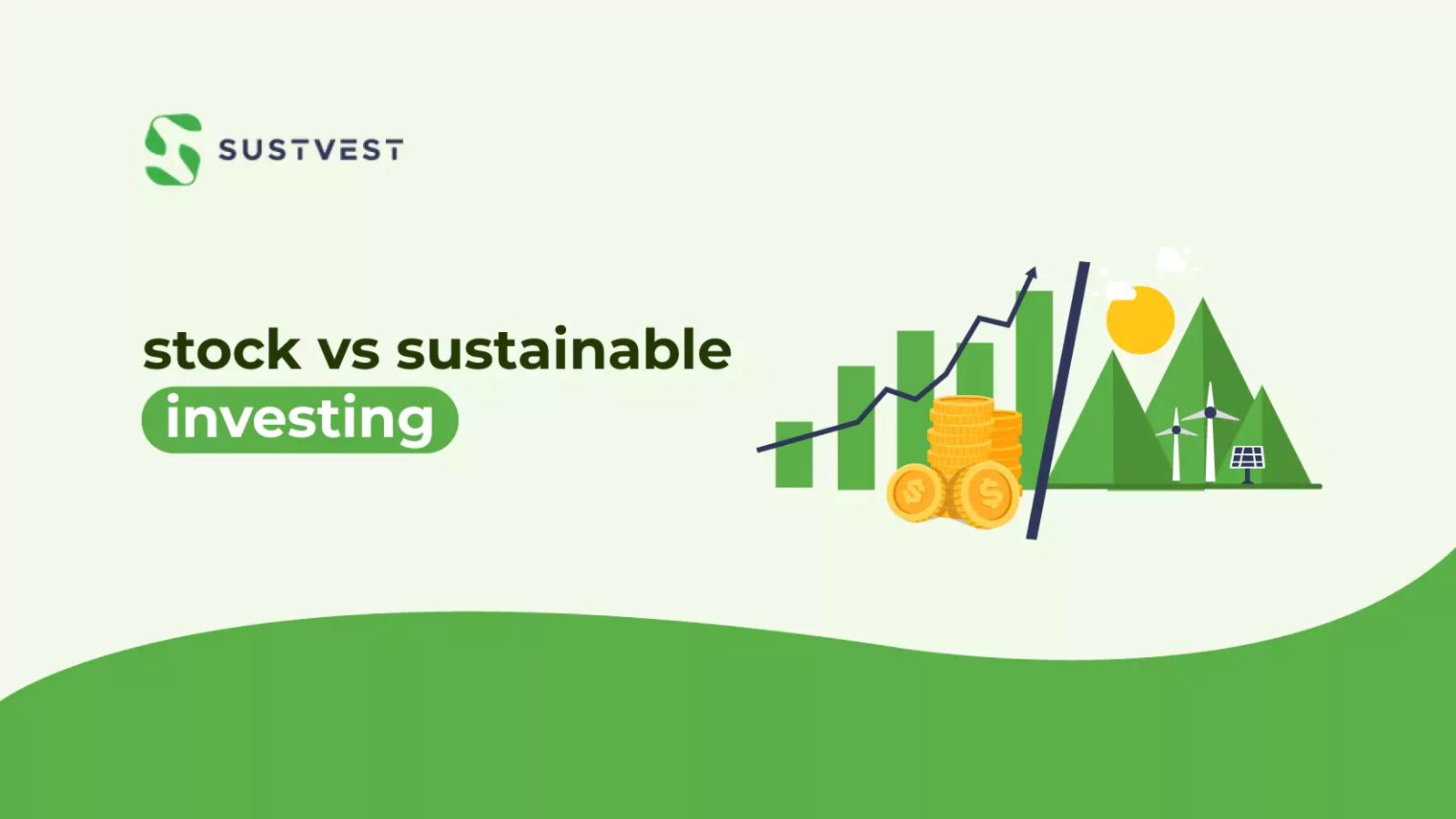In India’s buzzing investment scene, stock vs sustainable investing is the talk of the town.
Imagine you’re at a party: On one side is stock investing, the old pal everyone knows who’s all about making that quick buck.
On the other is sustainable investing, the newer friend who’s passionate about doing good for the world while also earning.
Now, which one do you want to dance with?
Each choice tells a story about your priorities and where you see our world heading.
Dive in with us, and let’s simplify this intriguing dance-off, ensuring you pick the right partner for your financial journey.

What is Stock Investment?
Stock investment, is also known as an equity investment. Equity investment presents a promising opportunity for substantial profits in a dynamic market, but it also comes with high risks.
Investors seek assistance from brokers or financial advisors who facilitate smooth trading to navigate this investment path.
The stock market serves as a platform for buying and selling securities, assuring investors of potential payouts. Timing is crucial in this venture, with share prices dictating the opportune moments for buying or selling.
Investing in a company’s shares means holding a stake in its ownership, promoting expansion and profitability.
Remember that understanding a company’s background aids in making informed decisions and avoiding non-performing ventures, safeguarding one’s investment.
Types of Stock Investment
Investors can choose from several stock investments. Each has distinctive characteristics and risks.
Some common types of stock investments include:
- Equity Shares
- Futures and Options
- Equity Mutual Funds
- Mutual Funds with Equity Exposure
- Alternative Investment Funds
1. Equity Shares
Shares are units of a company representing ownership, and shareholders are individuals who own them.
Retail investors can acquire shares in the primary market through an IPO or in the secondary market when listed on the stock exchange. Shareholders benefit from capital appreciation or dividends.
Companies issue two types of shares: common, granting voting rights and participation in corporate actions, and preference shares, providing priority in bankruptcy scenarios over common shareholders.
These shares offer distinct rights and privileges, making them important choices for investors seeking different levels of involvement and protection in a company’s operations and financial situation.
2. Futures and Options
Futures and options are derivative contracts based on underlying assets, deriving their value from them. They don’t grant direct ownership, merely a right or obligation to buy or sell at a predetermined price in the future.
Unlike equity shares, they require a smaller margin amount for large trades. Due to their short-term expiration (usually 3 months), they aren’t suitable for long-term investments and carry inherent risks as speculative bets on share prices.
These contracts are more suitable for experienced investors who understand the market and can use them for hedging or speculation purposes.
3. Equity Mutual Funds
Equity mutual funds pool investors’ money to invest in shares of various companies, providing professional management, built-in diversification, and cost-effectiveness compared to direct equity investments.
These funds are classified as equity funds if they allocate more than 65% to equity. They offer market-linked performance with lower risk than direct equity investments.
Equity funds come in various types based on market capitalisation, including
- Large-cap
- Mid-cap
- Small-cap
- Large and mid-cap
- Multi-cap funds
There are also sector-based funds focusing on specific industries and tax-saving options like equity-linked savings schemes (ELSS).
4. Mutual Funds with Equity Exposure
Hybrid funds offer equity exposure without the full commitment of equity funds. They include aggressive hybrid, dynamic asset allocation, balanced hybrid, arbitrage, and equity savings funds.
These funds invest in multiple asset classes, including equity, debt, and cash, providing moderate returns and reduced risk compared to pure equity funds.
5. Alternative Investment Funds
Alternative investment funds are privately pooled investments targeting high-net-worth investors, investing in diverse assets like start-ups, private equity, derivatives, and equities.
They have higher transaction fees and substantial minimum investments compared to regular mutual funds. These funds are less regulated but offer potentially high returns, accompanied by considerable risk.
The minimum investment is Rs 1 crore for native Indians, NRIs, and foreign nationals. Hedge funds, venture capital funds, and private-public equity investments are alternative investment funds.
Who Should Invest in Stock?
To be a stock investor, you must be willing to take risks, as market-linked investments are not suitable for risk-averse individuals. If you lack time or knowledge, you can earn smart returns with moderate risk through equity mutual funds.
The key is to stay invested for the long term, understanding that short-term fluctuations are normal in the stock market. Choose a good equity fund, embrace market ups and downs, and stay invested to minimise risk and maximise returns.
Taking the plunge into stocks requires a primer. Dive into our guide on Investment Advice for Beginners: What You Need to Know for a smoother start.
What is Sustainable Investing?
Sustainable investing channels funds to companies that address climate change and environmental issues and uphold corporate responsibility.
Sustainability, with its focus on meeting present needs without compromising future generations, comprises three pillars: economic, environmental, and social aspects, often referred to as profits, planet, and people.
By integrating these dimensions, sustainable investing seeks to promote a more responsible and inclusive economy that safeguards both the environment and society while driving positive change for the future.
There are various factors you should consider before executing sustainable investing:
- ESG Performance: Assess the company’s environmental, social, and governance practices.
- Impact Measurement: Evaluate the investment’s potential positive impact on sustainability issues.
- Financial Performance: Analyze the financial stability and growth prospects of sustainable companies.
- Risk Analysis: Consider the risks associated with sustainability factors and their potential impact on returns.
- Alignment with Values: Ensure the investment aligns with your personal values and sustainability goals.
Stock vs Sustainable Investing – Which One is Better?
The choice between stock investing and sustainable investing depends on your personal financial goals, risk tolerance, and values.
If Investing in Stock:
- Stock investing can potentially offer higher returns but comes with higher risks.
- It primarily focuses on financial gains and may not consider the environmental or social impact of the investments.
- It can be suitable for investors seeking higher profits and are willing to accept market volatility.
If Investing in Sustainable:
- Sustainable investing aims to generate financial returns while also promoting positive environmental and social outcomes.
- It considers companies’ ESG performance and aligns investments with sustainability goals.
- It can be appealing to investors who want to make a positive impact on society while earning returns.
Here is a table summarising the above points:
| Aspect | Stock Investing | Sustainable Investing |
| Focus | Primarily on financial returns | Balances financial returns with environmental and social impact |
| Investment Strategy | Seeks profit through capital appreciation | Aims for long-term value creation with sustainable practices |
| ESG Consideration | May or may not consider ESG factors | Integrates ESG criteria into investment decisions |
| Risk Management | Emphasizes traditional risk analysis | Addresses both financial and sustainability risks |
| Impact on Society | May not directly contribute to social or environmental goals | Intends to promote positive societal and environmental outcomes |
In many cases, a balanced approach can be beneficial. Investors might choose to have a portion of their portfolio in traditional stocks for potentially higher returns and another portion in sustainable investments to support causes they believe in.
Remember, both approaches have their merits, and it’s crucial to consider your financial goals, risk tolerance, and values before making investment decisions. Consulting with a financial advisor can also provide valuable guidance tailored to your specific needs.
While balancing traditional and sustainable investments, ever wondered How to Make a Successful Long Term Investment Decision (2023)? That’s another crucial chapter in your investment journey.
FAQs On Stock vs Sustainable Investing
What is the main difference between Stock and Sustainable Investing?
Stock investing focuses on buying shares of companies with potential for financial returns, while Sustainable Investing considers environmental, social, and governance factors to promote positive societal impact alongside financial gains.
Can Sustainable Investing yield competitive returns compared to traditional stock investments?
Yes, Sustainable Investing has shown evidence of competitive financial performance, proving that aligning investments with ethical values don’t compromise returns and, in some cases, can even outperform traditional stocks.
Is Sustainable Investing limited to specific industries or sectors?
No, Sustainable Investing encompasses a wide range of industries. It includes companies committed to environmental sustainability, social responsibility, and ethical governance, irrespective of their sector.
How does Sustainable Investing contribute to a more sustainable future?
Sustainable Investing directs capital towards businesses that adopt eco-friendly practices, prioritise social well-being, and uphold ethical standards. By doing so, it supports the transition to a more sustainable and responsible global economy.
Conclusion
The debate between Stock and Sustainable Investing has shed light on the differing approaches to wealth creation and societal impact.
While traditional stock investing focuses on short-term gains and market performance, sustainable investing prioritises long-term sustainability, environmental responsibility, and ethical considerations.
As we navigate a world increasingly aware of its ecological footprint, Sustainable Investing emerges as a compelling choice for conscientious investors seeking both financial returns and positive societal outcomes.
After understanding these investing routes, it’s intriguing to ponder upon the Future of Sustainable Investing in India. How will it shape the financial landscape?
To make a meaningful impact on our planet’s future and our portfolios, it’s time to embrace SustVest and usher in a more sustainable and responsible era of investing.

Founder of Sustvest
Hardik completed his B.Tech from BITS Pilani. Keeping the current global scenario, the growth of renewable energy in mind, and people looking for investment opportunities in mind he founded SustVest ( formerly, Solar Grid X ) in 2018. This venture led him to achieve the ‘Emerging Fintech Talent of the Year in MENA region ‘ in October 2019.




